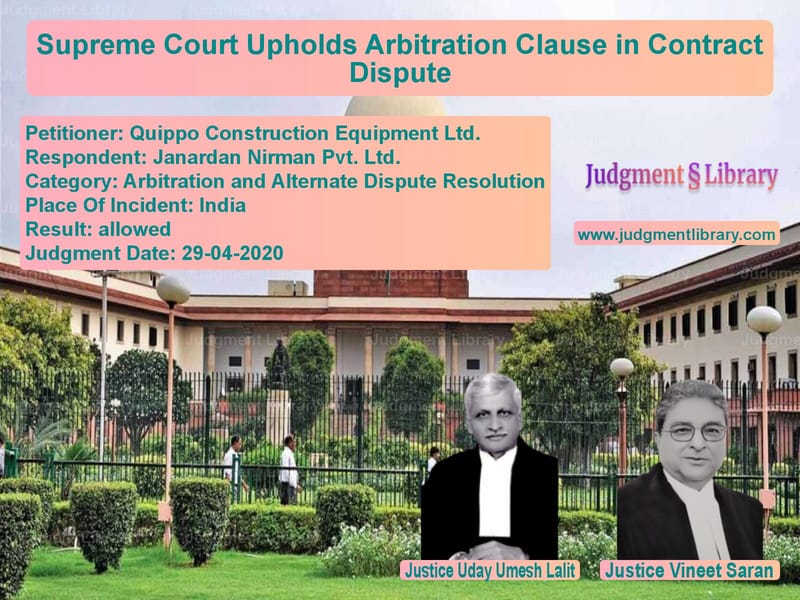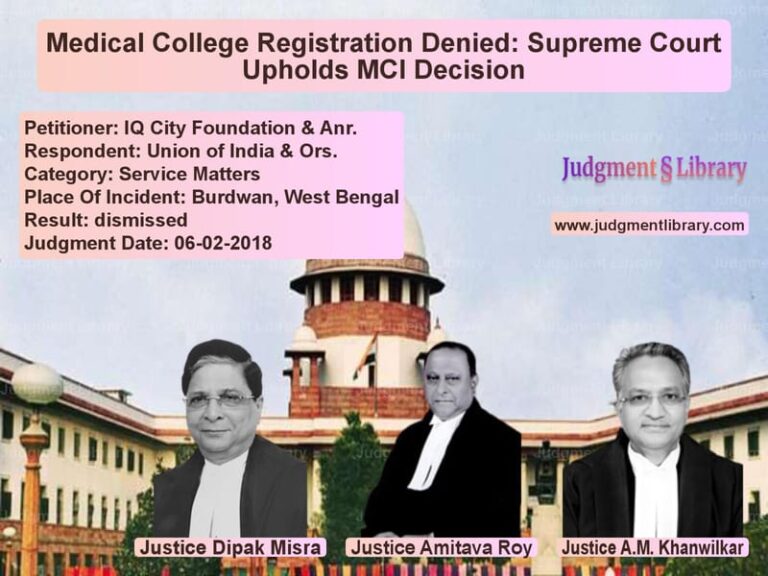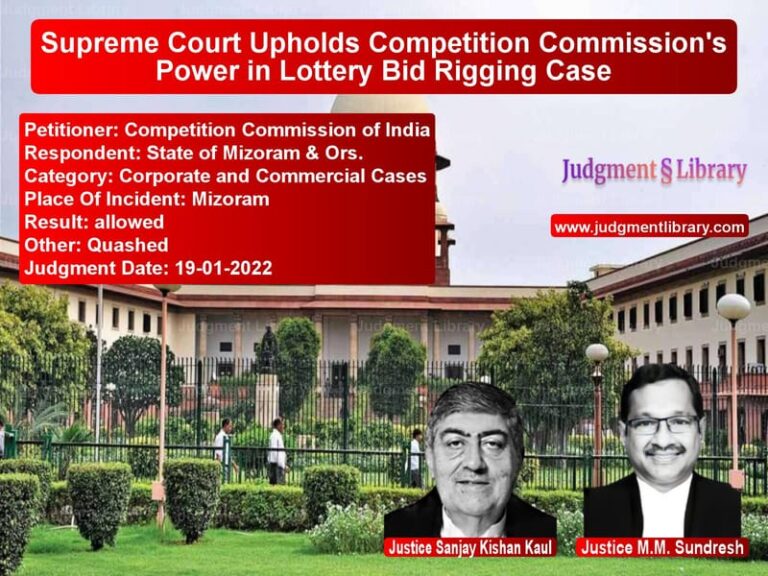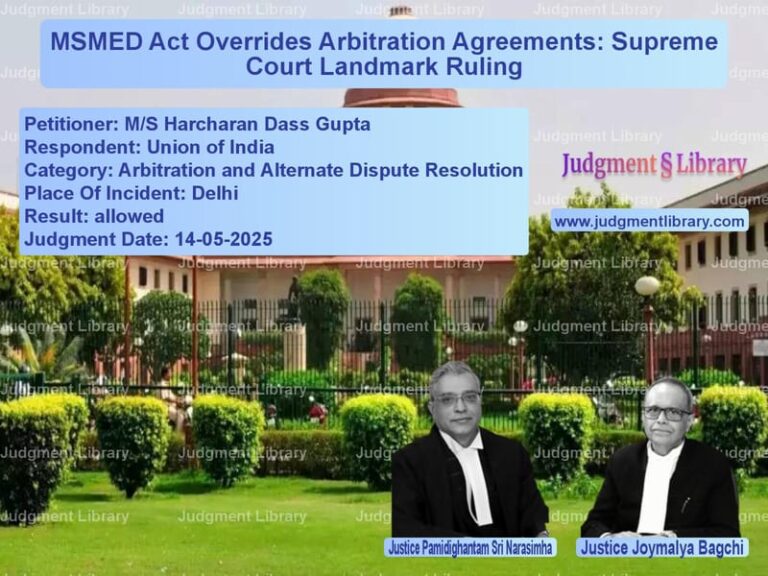Supreme Court Upholds Arbitration Clause in Contract Dispute
The Supreme Court of India recently delivered a significant judgment in the case of Quippo Construction Equipment Ltd. vs. Janardan Nirman Pvt. Ltd., addressing the enforcement of arbitration clauses in commercial contracts. The ruling clarifies the legal position on arbitration agreements and the jurisdictional authority of arbitral tribunals.
Background of the Case
Quippo Construction Equipment Ltd. (the appellant) had entered into multiple agreements with Janardan Nirman Pvt. Ltd. (the respondent) for leasing construction equipment. The agreements contained arbitration clauses specifying different jurisdictions, including New Delhi and Kolkata.
Disputes arose when the respondent failed to make payments as per the contractual terms. The appellant initiated arbitration proceedings under the Construction Industry Arbitration Association (CIAA) Rules, appointing a sole arbitrator. However, the respondent challenged the arbitration process, leading to legal proceedings in various courts.
Legal Issues Considered
- Whether the arbitration agreements were valid and enforceable.
- Whether the respondent had waived its right to object to the arbitration proceedings.
- The jurisdiction of courts in arbitration-related disputes.
- The principle of party autonomy in commercial arbitration.
- The role of courts in interfering with ongoing arbitration proceedings.
Arguments by the Petitioner
The petitioner, Quippo Construction Equipment Ltd., argued that:
- The agreements explicitly provided for arbitration in case of disputes.
- The respondent had participated in the agreements and had not objected to the arbitration clause at the time of execution.
- The respondent’s failure to make timely payments justified the invocation of arbitration.
- The jurisdiction of the arbitrator was clearly defined in the agreements and should be upheld.
- Allowing the respondent to challenge arbitration midway would violate the principle of party autonomy.
Arguments by the Respondent
The respondent, Janardan Nirman Pvt. Ltd., contended that:
- The arbitration clauses were inconsistent and created ambiguity regarding the appropriate jurisdiction.
- The agreements were allegedly not executed with proper consent and should be deemed void.
- The arbitration proceedings were initiated without giving due notice and opportunity to the respondent.
- The involvement of multiple arbitration venues caused procedural irregularities.
- The arbitration mechanism unfairly favored the petitioner.
Supreme Court’s Observations
The Supreme Court examined the validity of the arbitration clauses and made the following key observations:
- The arbitration agreements were clear and unambiguous, and the respondent had willingly entered into them.
- The respondent failed to raise objections regarding jurisdiction at the appropriate stage of the arbitration proceedings.
- The objections raised by the respondent were an afterthought and lacked legal merit.
- Courts should respect the principle of party autonomy in arbitration matters.
- Interference by courts in arbitration proceedings should be minimal and limited to cases of serious procedural irregularities.
Final Judgment
The Supreme Court ruled in favor of the appellant, stating:
“Where parties have willingly entered into an arbitration agreement, courts must enforce such agreements in accordance with the applicable arbitration laws.”
The Court held that the arbitration proceedings were valid and that the respondent had waived its right to object by not raising jurisdictional issues in a timely manner. The appeal was allowed, and the lower court’s ruling was overturned.
Implications of the Judgment
This ruling has significant implications for commercial contracts and arbitration proceedings in India:
- It reinforces the enforceability of arbitration clauses in business agreements.
- It discourages parties from raising frivolous jurisdictional objections after participating in arbitration proceedings.
- It strengthens the legal framework supporting alternative dispute resolution mechanisms.
- It establishes clear guidelines on when courts can intervene in arbitration matters.
- It promotes the use of arbitration as a faster and more efficient dispute resolution method.
Conclusion
The Supreme Court’s decision in Quippo Construction Equipment Ltd. vs. Janardan Nirman Pvt. Ltd. sets a strong precedent for the enforceability of arbitration clauses. The ruling upholds the principle that parties must adhere to the dispute resolution mechanisms agreed upon in their contracts. This judgment is expected to promote confidence in arbitration as an effective means of dispute resolution in commercial transactions.
Petitioner Name: Quippo Construction Equipment Ltd..Respondent Name: Janardan Nirman Pvt. Ltd..Judgment By: Justice Uday Umesh Lalit, Justice Vineet Saran.Place Of Incident: India.Judgment Date: 29-04-2020.
Don’t miss out on the full details! Download the complete judgment in PDF format below and gain valuable insights instantly!
Download Judgment: Quippo Construction vs Janardan Nirman Pvt. Supreme Court of India Judgment Dated 29-04-2020.pdf
Direct Downlaod Judgment: Direct downlaod this Judgment
See all petitions in Arbitration Act
See all petitions in Enforcement of Awards
See all petitions in Dispute Resolution Mechanisms
See all petitions in Judgment by Uday Umesh Lalit
See all petitions in Judgment by Vineet Saran
See all petitions in allowed
See all petitions in supreme court of India judgments April 2020
See all petitions in 2020 judgments
See all posts in Arbitration and Alternate Dispute Resolution Category
See all allowed petitions in Arbitration and Alternate Dispute Resolution Category
See all Dismissed petitions in Arbitration and Alternate Dispute Resolution Category
See all partially allowed petitions in Arbitration and Alternate Dispute Resolution Category







